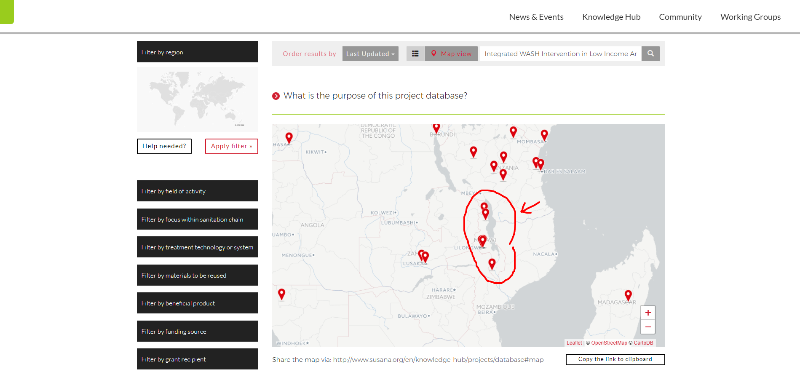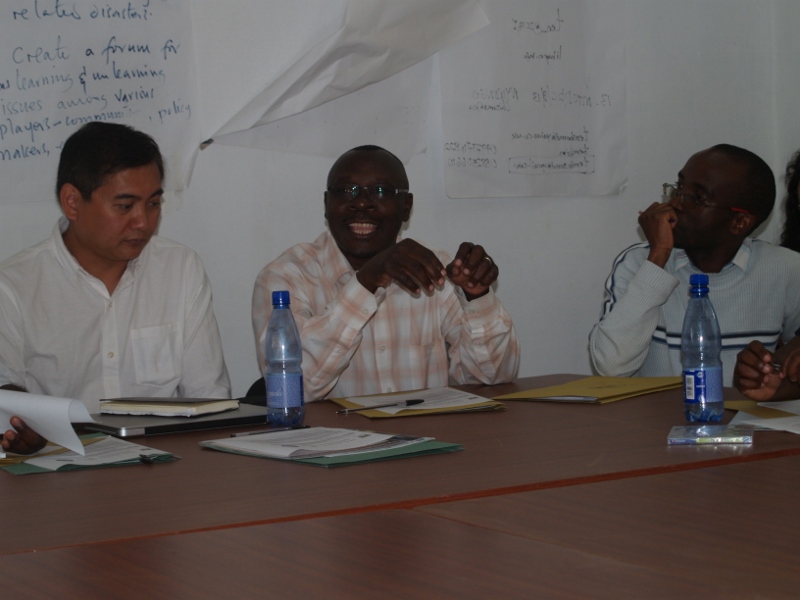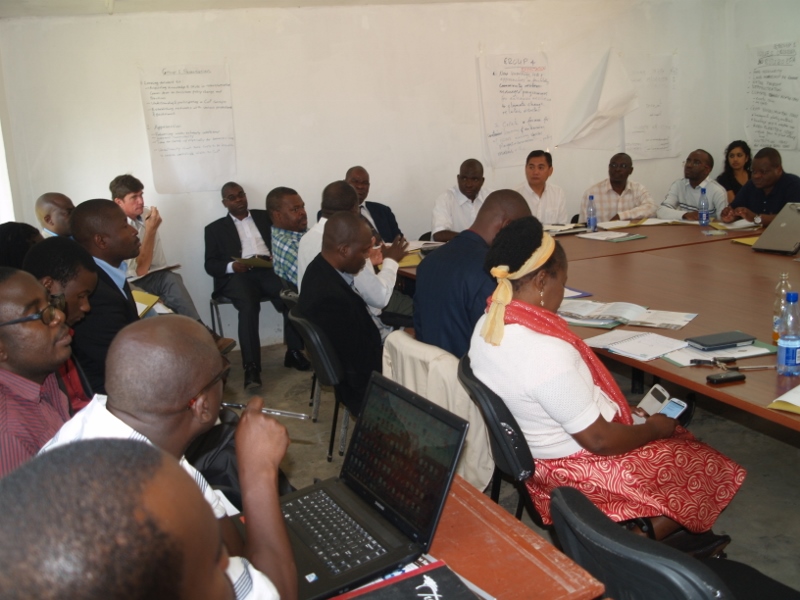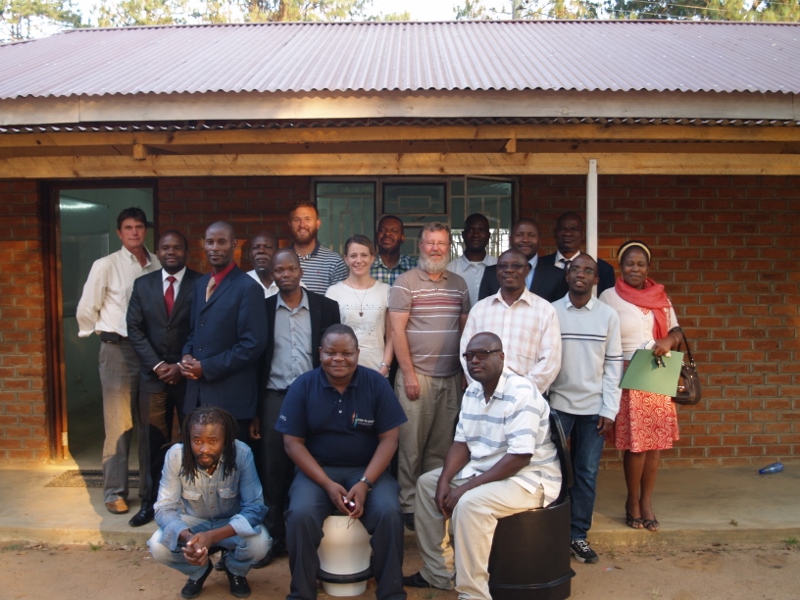- Sanitation systems
- Faecal sludge management (FSM)
- Faecal sludge transport (including emptying of pits and septic tanks, transfer stations)
- Solutions for pit desludging and sludge management in low income urban settlements in Malawi (Mzuzu University) - and policy issues
Solutions for pit desludging and sludge management in low income urban settlements in Malawi (Mzuzu University) - and policy issues
44.3k views
- rochelleholm
-
 Topic AuthorLess
Topic AuthorLess- Posts: 99
- Karma: 4
- Likes received: 38
Re: Update: Solutions for pit desludging and sludge management in low income urban settlements in Malawi (Mzuzu University)
Sanitation service delivery in smaller urban areas (Mzuzu and Karonga, Malawi)
by: Rochelle H Holm, Alinafe Kamangira, Mavuto Tembo, Victor Kasulo, Hastings Kandaya, Peter Gijs Van Enk and Alex Velzeboer
Environment & Urbanization
DOI: 10.1177/0956247818766495
Abstract: This paper assesses the provision of sanitation services in two urban areas in northern Malawi, both with populations under 150,000, to determine the potential for private sector enterprises to contribute to longer term self-reliance as part of the overall sanitation situation. The paper shows that most households in the two study areas use pit latrines and remain unserved with regard to both faecal sludge management and solid waste removal. Local governments have been unable to offer adequate coverage of sanitation services, and community-based organizations are doing very little that is relevant to the issue. This gap offers a viable business opportunity for private sanitation service providers. Of these two urban areas, Karonga Town has no formal private sector services, but Mzuzu City has pit emptying and solid waste collection services, plus some small-scale manufacturers of pre-made pit latrine slabs. The paper explores these activities, considering their accessibility to low-income customers. It closes with suggestions regarding the potential for building on what is currently available.
To help you access the full article, please visit: journals.sagepub.com/doi/full/10.1177/0956247818766495
Mzuzu (Malawi)
Please Log in to join the conversation.
You need to login to reply- Elisabeth
-
- User is blocked
- Freelance consultant since 2012
Less- Posts: 3372
- Karma: 54
- Likes received: 932
Re: Update: Solutions for pit desludging and sludge management in low income urban settlements in Malawi (Mzuzu University)
Thanks for this project update. Sounds very interesting. Will there be a follow-up after a year or two to see what came of it? i.e. how the 10 entrepreneurs fared in the medium term?
Also, could we get the mentioned project included in the SuSanA project database so that it's easier for people to find it again in future? If you send me some basic information about it (or its website link) I could add it to the project database. Or, even better, join Mzuzu University up as a SuSanA partner, then you can add your projects yourself. You might have too many individual projects to add but perhaps the main ones would be worth adding?
So far we have these in Malawi:
www.susana.org/en/knowledge-hub/projects/database
(zoom the map into Malawi; by the way, I know your internet access is slow. Is the loading time for the map OK or is it a problem? You can also add Malawi in the search field and next week we should finally have the country filter functional, too).
The screenshot here is not clickable and zoomable (the link above is) but just to give you an impression of the locations of the projects in Malawi so far:
Regards,
Elisabeth
Freelance consultant on environmental and climate projects
Attachments:
-
 ProjectsinMalawi.png
(Filesize: 97KB)
ProjectsinMalawi.png
(Filesize: 97KB)
Please Log in to join the conversation.
You need to login to reply- rochelleholm
-
 Topic AuthorLess
Topic AuthorLess- Posts: 99
- Karma: 4
- Likes received: 38
Re: Update: Solutions for pit desludging and sludge management in low income urban settlements in Malawi (Mzuzu University)
On of the lessons learned is that successful examples for FSM and solid waste are there for larger African cities, but for small (but growing) cities, less than 150,000 people, there was a gap in knowledge on best practices for us to follow.
This work emerges from a wider project entitled “Integrated WASH Intervention in Low Income Areas (LIA) in Mzuzu and Karonga” funded by the European Union.
Mzuzu (Malawi)
Please Log in to join the conversation.
You need to login to reply- Daniel82
-

- Shit is not a bad word!
Less- Posts: 5
- Likes received: 2
Re: Solutions for pit desludging and sludge management in low income urban settlements in Malawi (Mzuzu University) - and policy issues
I write to share the progress made for my research work on investigating Faecal Sludge Management (FSM) Policy gaps in Mzuzu City – Malawi.
I did household surveys to determine the current FSM practice in the city. I discovered that over 50% of households did not own the residential premises which made it difficult for them to make decisions on the facilities. The city does not recommend any specific type of facility which leads to people just constructing any type. This coupled with distance to sludge ponds leads to varying costs of pit emptying services. Additionally, some households construct deep pits in areas with high water tables which risks contamination of ground water.
A review of government WASH related policy documents and Acts showed that they are disjointed as they are not clear as to which entity is mandated to do what and which one is responsible to enforce the guidelines. From the research work, FSM guidelines are going to be developed for the city basing on the already existing by-laws for solid waste management.
I therefore invite any input towards suggestions on what needs to be incorporated in the guidelines for FSM considering the background given. You may also wish to look at the paper presented at the 38th WEDC International Conference and comment. Follow the link below:
wedc.lboro.ac.uk/resources/conference/38/Nyirenda-2257.pdf
+++++++++
Note by moderator:
Results from this project are available in several threads on the forum. To find them, have a look at the first post in this thread, from where they are linked.
WASH Project Officer/ MSc in Sanitation Student
Mzuzu University
Mzuzu.
Please Log in to join the conversation.
You need to login to reply- Daniel82
-

- Shit is not a bad word!
Less- Posts: 5
- Likes received: 2
Re: Solutions for pit desludging and sludge management in low income urban settlements in Malawi (Mzuzu University) - and policy issues
With the MOU between Mzuzu University and The City Council in place, I had an opportunity to work closely with the Director of Health and Social Services whose department is in charge of sanitation in the city as mandated by the Local Government Act of the Republic of Malawi. During this period, access to the By-Laws and The Sanitation Bill which is awaiting enactment by Parliament, was granted. The By-Laws of the City are archaic and the miss a lot of things including FSM so a task to align them with the Sanitation Bill was incumbent upon the researcher. These By-Laws were formulated in 1992 and have not been amended since then such that the fines therein are less that the service charges. In addition, one stakeholder consultative meeting was held were all WASH stakeholders in the City including Entrepreneurs and Service Providers were invited. This forum provided a good platform for identification of who is doing what in the city. This meeting laid a strong foundation for future meetings of a similar nature which I plan to conduct in order to get information relevant for policy development.
Currently, a review of several pieces of legislation is in progress to identify what is complimentary and what is antagonistic among these documents.
WASH Project Officer/ MSc in Sanitation Student
Mzuzu University
Mzuzu.
Please Log in to join the conversation.
You need to login to reply- rochelleholm
-
 Topic AuthorLess
Topic AuthorLess- Posts: 99
- Karma: 4
- Likes received: 38
Re: Update: Solutions for pit desludging and sludge management in low income urban settlements in Malawi (Mzuzu University)
1.) Plan Malawi as funded by the European Union (EU). The Plan Malawi target in Mzuzu for the PUSH project is 84,000 residents from 19,090 households, 14,400 school learners from 9 schools in 6 peri-urban locations of Mzuzu City (Chiputula, Masasa, Luwinga, Zolozolo, Mchengautuwa, Chibanja). The outputs are: Construction of 12 affordable privately run toilets in market places; construction of 18 VIP latrines in schools; construction of 48 ecological toilets in schools; promote construction of 2500 improved toilets at household level; conduct 54 triggering sessions; training of extension workers (HSAs and others) and 10 CBOs in sanitation marketing and UCLTS; hygiene promotion campaigns; promote use of 3Rs in waste management in informal settlements, markets and schools. Lastly this project will strive to conduct other capacity building activities for Mzuzu City Council members and sanitation entrepreneurs.
2.) Malawi Red Cross Society as funded by the European Union (EU). Malawi Red Cross Society is also conducting a WASH Project (30 months) in 6 peri-urban locations of Mzuzu City, within different areas from Plan Malawi. They aim to improve community knowledge, attitudes and practices on safe water, hygiene and sanitation; increase access to potable water through the construction of 15 water kiosks and the rehabilitation of 15 non-functioning water kiosks (30,000 inhabitants from the project areas); increase sanitation coverage in households, including schools, markets and bus stands, taking into consideration the needs of special groups; facilitate pit emptying and proper disposal of sludge. Lastly, they will build the capacity of private sector and authorities at local level to support community and other initiatives to improve access to safe water, adequate sanitation and hygiene.
These two projects are noticeably similar, and are being coordinated by Mzuzu City Council to ensure linkages but no overlaps.
Thank you to Dan Nyirenda for helping pull together this summary information. Dan is currently working to develop a FSM policy for Mzuzu City which would cover activities under both of these projects through his Master’s study at Mzuzu University.
Mzuzu City is considered urban. It was also specifically asked what sanitation technologies will be used under the Mzuzu sanitation projects. For both projects, the City Council guidance is the same. For construction of toilets at schools, it will be primarily eco-san toilets but other designs may be considered in line with Government approved designs for schools and preferences of the individual schools. Household toilets in urban areas may additionally include pour-flush. Sewer systems are not being built under either of the projects.
Mzuzu (Malawi)
Please Log in to join the conversation.
You need to login to reply- Elisabeth
-
- User is blocked
- Freelance consultant since 2012
Less- Posts: 3372
- Karma: 54
- Likes received: 932
Re: Update: Solutions for pit desludging and sludge management in low income urban settlements in Malawi (Mzuzu University)
Dear Rochelle,
You mentioned this large EU project in Malawi (allafrica.com/stories/201306250338.html). It is € 24 million and will provide access to sanitation for this number of people:
The project will benefit 84,000 people from 19,090 households, and 14, 400 learners from nine schools in peri-urban areas of Masasa, Chibavi, Chibanja, Zolozolo, Luwinga and Mchengautuwa.
As a simplistic sanity check (I know there are also project overheads and so forth), this would be 240 Eur per person. This seems like a lot of money and makes me think the money will be used to build sewer systems?
The article doesn't state which sanitation technologies will be used - do you know?
Also you mentioned:
Unfortunately most of the sanitation research in Malawi is urban, rather than rural.
And here I am wondering what is your definition of urban and rural is? Is the town of Mzuzu regarded as urban or rural (or both)? Some town planners in developing countries use the simplistic definition sewer = urban, no sewer = rural, is that also the case in Malawi perhaps?
Regards,
Elisabeth
Freelance consultant on environmental and climate projects
Please Log in to join the conversation.
You need to login to reply- rochelleholm
-
 Topic AuthorLess
Topic AuthorLess- Posts: 99
- Karma: 4
- Likes received: 38
Re: Update: Solutions for pit desludging and sludge management in low income urban settlements in Malawi (Mzuzu University)
Mzuzu City Council gave an oral presentation. A local news article for more on the project can be found at: allafrica.com/stories/201306250338.html
SHARE grant does a great job in Malawi bringing together grantees, and sharing news and research findings.
Our Centre also has SHARE work, more information can be found at: www.shareresearch.org/NewsAndEvents/Detail/Rochelle's_blog
Unfortunately most of the sanitation research in Malawi is urban, rather than rural. This is a big gap in knowledge.
Regards,
Rochelle
[End of Page 1 of the discussion]
Mzuzu (Malawi)
Please Log in to join the conversation.
You need to login to reply- Elisabeth
-
- User is blocked
- Freelance consultant since 2012
Less- Posts: 3372
- Karma: 54
- Likes received: 932
Re: Update: Solutions for pit desludging and sludge management in low income urban settlements in Malawi (Mzuzu University)
Thanks for this information. It looks like you had a really interesting workshop on FSM for people from Malawi, Zambia and Zimbabwe.
Would it be possible that you also post the presentations? I am particularly curious about the presentation from Mzuzu City Council, as I hadn't heard about their project before:
Mzuzu City Council, Lilian Chirwa (Director of Public Health). The focus of the presentation was detailing current projects Mzuzu City is undertaking such as the Peri-Urban Sanitation and Hygiene Project (PUSH) with funding from European Union and in partnership with Plan Malawi. In this project they are targeting areas with low and high water table in promotion of appropriate sanitation facilities including composting toilets (Ecosan/Skyloos), improved latrines, and Ventilated Improved Pit (VIP) latrines. Currently Mzuzu has no sewer [...].
Also I am wondering if you have any exchanges with a project that sounds a bit similar in Blantyre? I saw it mentioned here on Sanitation Updates recently:
sanitationupdates.wordpress.com/2014/10/...ject-and-ccode-work/
It's a project by SHARE and CCode: "SHARE’s work to date in Malawi has focused on Ecological Sanitation (Ecosan), which has been heavily promoted in urban areas. Blantyre in Malawi is also one of the cities included in the City-Wide Sanitation Project."
Are you having a good exchange with different cities in Malawi or is everyone pretty much doing their own thing?
Regards,
Elisabeth
Freelance consultant on environmental and climate projects
Please Log in to join the conversation.
You need to login to reply- rochelleholm
-
 Topic AuthorLess
Topic AuthorLess- Posts: 99
- Karma: 4
- Likes received: 38
Re: Update: Solutions for pit desludging and sludge management in low income urban settlements in Malawi (Mzuzu University)
Presentations from Participants:
1. Prof. Chris Buckley and Dr. Tina Velkushanova: Pit Latrines and Emptying in Durban, Southern Africa.
2. Mzuzu City Council, Lilian Chirwa (Director of Public Health). The focus of the presentation was detailing current projects Mzuzu City is undertaking such as the Peri-Urban Sanitation and Hygiene Project (PUSH) with funding from European Union and in partnership with Plan Malawi. In this project they are targeting areas with low and high water table in promotion of appropriate sanitation facilities including composting toilets (Ecosan/Skyloos), improved latrines, and Ventilated Improved Pit (VIP) latrines. Currently Mzuzu has no sewer and long standing plans are that Northern Region Water Board shall undertake this project. The City has three sludge ponds which are not well maintained and it is planned through the PUSH project rehabilitation shall be undertaken. Other plans include the need to construct neighborhood transfer stations for fecal sludge collection.
3. Presentation from Water for People Malawi by Mr. Magoya: Pit Emptying Technology (Gulper, Rammer and Solar Dryer).
4. Presentation from Polytechnic by Ass. Prof. Bernard Thole: Characterization of Pit Sludge Management, Sludge Biochemical Degradation, and Respective Impacts on Public Health in Unplanned Settlements of Malawi.
5. Presentation from University of North Carolina by Tate Rogers: Pit latrine Auger (Excavator) development and testing.
6. Presentation from Mzuzu University by Daniel Nyirenda: Fecal Sludge Management in Mzuzu, Malawi: Investigating policy gaps.
7. Presentation from Mzuzu University by Willy Chipeta: Investigation on New Technologies for Pit desludging in Peri Urban Mzuzu, Malawi
8. Presentation from Mzuzu University by James Kushe: Investigation and development of new fecal sludge emptying technologies for peri-urban areas in Mzuzu.
Roundtable Discussion Summary:
Barriers to improved Fecal Sludge Management:
* Behavior change (rubbish in latrines is wide spread)
* New latrine designs are being developed without consideration of pit emptying
* Lack of awareness on re-use of Fecal Sludge safety in agriculture
* Low earning capacity resulting from people demanding low cost services for emptying latrine sludge with high rubbish content
* Research has not been done on safe threshold of fecal sludge reuse for agriculture in Malawi
* Infrastructure such as transfer stations for fecal sludge collection are not available in Malawi
Opportunities to improved Fecal Sludge Management:
* Awareness for community education on how to properly use a latrine
* Local Development Fund as a tool for financing sanitation
* Waste reuse: Recycling, pellets for agriculture
Next Steps Forward:
* Regional Forums (Malawi, Zambia and Zimbabwe) to review FSM practices should be continued at a higher level such as holding a national FSM review.
* eThekwini Municipality in Durban is a site for mutual learning.
* There is need for research on potential contamination of fecal sludge in areas within Mzuzu that have high water table.
* Involve District Environmental Health Officers (EHO) to begin to share experiences on FSM.
* Involve politicians to be part of knowledge sharing to raise awareness for behavior change.
Mzuzu (Malawi)
Attachments:
-
 P1010067800x600.jpg
(Filesize: 171KB)
P1010067800x600.jpg
(Filesize: 171KB)
-
 P1010057800x600.jpg
(Filesize: 222KB)
P1010057800x600.jpg
(Filesize: 222KB)
-
 P1010071800x600.jpg
(Filesize: 275KB)
P1010071800x600.jpg
(Filesize: 275KB)
Please Log in to join the conversation.
You need to login to reply- Daniel82
-

- Shit is not a bad word!
Less- Posts: 5
- Likes received: 2
Thank you so much for the guidance you have given me. I find all the links you have shared very useful. As you you have rightly put it that most cities do not have a stand-alone FSM policy and that issues of FSM are found in urban sanitation policies, I would still appreciate if I can get hold of one such policy document or more research papers on the same.
The study done by Steven Sudgen of Water for People on Catalyzing Sanitation as a business also provides some insight on FSM but I still need a lot of literature to look at.
I will keep you posted on the developments regarding my study and I will not hesitate to bring more questions for discussion.
Thank you so much,
Daniel
WASH Project Officer/ MSc in Sanitation Student
Mzuzu University
Mzuzu.
Please Log in to join the conversation.
You need to login to reply- Elisabeth
-
- User is blocked
- Freelance consultant since 2012
Less- Posts: 3372
- Karma: 54
- Likes received: 932
Re: Fecal Sludge Management Urban Policy
I wish you good luck with your research in Malawi, sounds really interesting.
I am not an expert in this but I have the feeling that in most countries, there is no separate FSM policy but it is rather part of the overall (urban) sanitation policy.
So during your literature search, this may be a better search term.
You will find some information on sanitation policies in threads posted in this category on the forum (upscaling, sanitation governance, institutional aspects, policies):
forum.susana.org/forum/categories/142-up...-sanitation-policies
Also, it seems that when it comes to FSM, it is all the rage these days to look at it more from a business perspective rather than from purely a governance perspective. Hence, if you search for "sanitation as a business" you also find interesting documents.
For example, I posted here about a "landscape" analysis by consultants for the BMGF in 10 countries in Asia and Africa:
forum.susana.org/forum/categories/53-fae...-towns-in-india#3023
Countries in Africa that are included:
Burkina Faso, Ethiopia, Kenya, Nigeria, Senegal.
I also had a quick look in the SuSanA library for you by putting sanitation policy in the search field:
www.susana.org/library?search=sanitation+policy
(and click on the right on the "select by technology" on FSM to narrow it down further)
This FSM field note from Zambia could be of relevance:
www.susana.org/en/knowledge-hub/resource...library/details/1771
How about the research of Water for People in your country Malawi regarding sanitation as a business - does it have any relevance for your work?
forum.susana.org/forum/categories/97-ena...bolivia-peru-ecuador
Then there is this document which does include some information on sanitation policies in several countries (Burkina Faso, Cameroon, Ghana, Kenya, Mozambique and Senegal):
WSA (2012). Benchmarking of Urban Sanitation Pricing and Tariffs Structure in Africa. Water and Sanitation for Africa, Ouagadougou, Burkina Faso.
www.susana.org/en/knowledge-hub/resource...library/details/1698
And documents from David Schaub-Jones on sanitation as a business in Africa:
www.susana.org/library?search=Schaub-Jones
I hope some of this is helpful?
Please let us know how things are progressing for you, and do bring up further points for discussion.
Regards,
Elisabeth
P.S. If you are more interested in health guideline policies for pit emptiers, then be sure to read this thread on the forum about the situation in Kenya:
forum.susana.org/forum/categories/53-fae...-exhauster-operators
Freelance consultant on environmental and climate projects
Please Log in to join the conversation.
You need to login to reply- Sanitation systems
- Faecal sludge management (FSM)
- Faecal sludge transport (including emptying of pits and septic tanks, transfer stations)
- Solutions for pit desludging and sludge management in low income urban settlements in Malawi (Mzuzu University) - and policy issues







